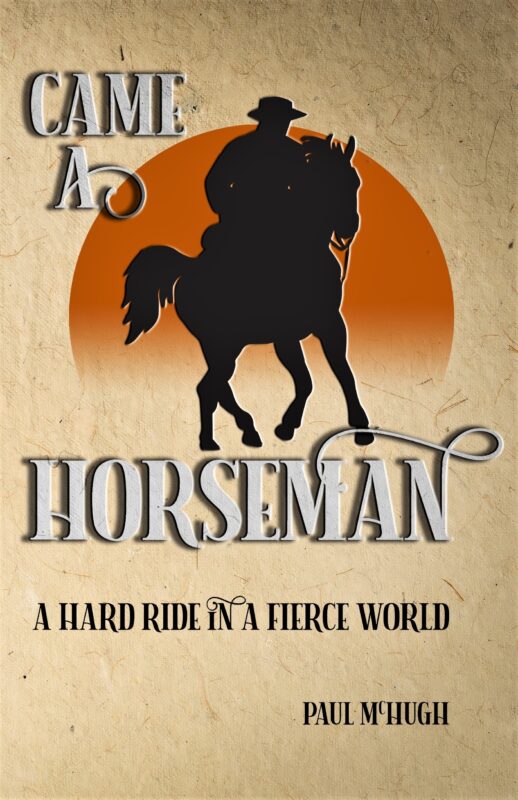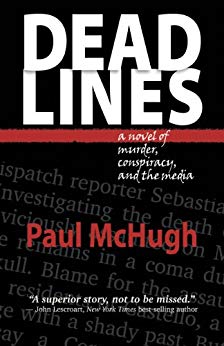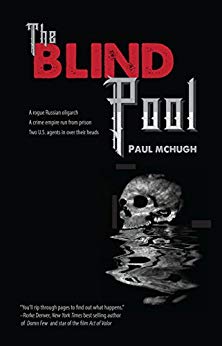Paul McHugh comments:
Here! The first freelance story I sold for actual money, in 1979. A bit of background may amuse. For a present, my girlfriend at the time bought me a leather suit coat, a two-button blazer, a garment that would have looked just right on a Vegas condo salesman. Risking her wrath, I promptly returned it to the store to exchange it for cash, then used that money to buy myself a PSA compound hunting bow. Next, following months of practice, I was ready to stalk the hills of Mendocino County.
Language in this piece is a tad clunky, I must admit. Still, I think a passion for nature still shines through. And you can’t beat its Zen sub-theme: the joys of missing.
A Shot To Remember
A rising sun changed everything from dim shadows to more recognizable shapes: Manzanita and tanoak trees, burned and fallen fir logs, the hollows of deer beds and deer trails that wound through tall, dry grass.
I had been sitting while the sun rose, largely motionless, holding an arrow nocked in my bow, for three hours. I shifted my aching hips and grumbled to myself. This was the third day of my first bowhunt in the hills of California, and though I had seen deer occasionally, and deer sign everywhere, I had yet to come close to drawing an arrow on anything. So far, my hunt had consisted of watching empty trails, feeling my joints creak, and running out of things to think about.
I was utterly, piercingly, transcendentally bored.
I sighed, yawned. Then I froze, transfixed by a movement on my left. A chipmunk scampered up the log that lay by my side. With its characteristic brisk, whisking motions, it drew nearer, giving me the once-over. Because I remained quite still, it decided I was probably okay. The little guy spent a quarter of an hour on that log, well-within reach of my hand. It frisked about, nibbled on things, and groomed itself as I watched and admired the beautiful shades of its fur, its cheeky insouciance.
When it finally scampered off, I rose to my feet, heartened by the fact that – even if my luck hadn’t drawn a buck – at least it had pulled something alive and wild and interesting near my vicinity.
I trekked back to the hogback ridge where I’d left my truck, then lolled and loitered through the hot part of the day. At mid-afternoon, I shaded my eyes to look up at the peak of the closest mountain, which stood about fifteen hundred feet higher, and worked out a plan for the evening hunt. A breeze now blew steadily from the southwest. My thought was to cut across the ridge, climb the east side to the peak, and approach the top from downwind, in the hope of rousing any late-napping blacktails.
Which is what I did. After struggling for an hour up slopes of crumbling rock sheathed in tangled brush, I made it to the summit, which was largely barren except for a few burned and shattered old firs. But I also discovered a benefit I hadn’t counted on: the view! This peak was the highest for miles. Around and below me, the beige and green waves of all the lesser hills stretched and rolled. Out to the west, some thirty miles away, I could even see a white blanket of fog floating above the Pacific like a second, ghostly ocean, washing softly about the coastal ends of these ridges.
Up here, the wind was keen and fresh, invigorating to breathe. I immediately decided the climb had been worth it, even if I saw no deer. But it seemed very likely that I would see some. Up here, all the deer trails looked well-worn, the black beans of deer droppings were fresh and numerous, and many of their beds were hollowed into the grass.
An arrow nocked, I moved slowly and deliberately upwind, following one of the deer trails, every sense alive for the faintest sound or movement. That was what probably kept me from stepping directly on the rattlesnake. He lay curled in the sunlight. I was about to place a boot in the middle of his coils when I heard the high, excited vibration of his warning rattle. My foot froze in mid-air as I stared down at a fat, healthy and obviously irritated snake an easy forty inches in length. There was no way I could hold my balance in this ridiculous posture. So, smoothly and quietly, I put my raised foot down well behind me, then slowly backed away. The ominous rattling went silent.
I told myself I was calm. But I also felt curiously breathless and weak. I plopped my tail down on a log and fingered the Cutter’s snakebite kit I carried in one pocket. I was extremely grateful that the snake had given me such a timely warning. Just a week earlier, I’d driven a friend of mine off a nearby mountain in a mad rush, while he went into convulsions from an exceptionally severe snakebite. He was still in the hospital, and the memory of that night was fresh. That had been enough rattler experience to last me a lifetime. I wasn’t eager to get a second, even closer look at what a dose of venom could do.
Still, it was entirely fair of the wilderness to turn the tables for a moment, and make me, the hunter, feel like prey.
Sobered, chastened, I stood to continue my stalk. I gave the snake’s turf a wide berth, and chose a trail with greater visibility of the ground. I startled a doe and she took off. Since I was upwind in a place where she’d likely seen no humans before, I figured curiosity would bring her back, and it did. For around three minutes, at a distance of about 18 yards, we waggled our ears at each other. Then she barked, whirled and ran – this time, for good. I continued moving downhill and upwind, looking for a good natural blind that looked upon a trail or a clearing, where I could await the evening deer traffic.
Halfway down from the peak, fighting over rockslides and through tangled branches again, I paused to take a rest break. While munching nuts from my belt pack and sipping water from my bota, I heard the “pat-pat-pat-pat” of animal footfalls, approaching through the mat of leaf litter that had fallen to earth from all that brush. The movement didn’t sound like a deer. So I did not reach for the bow, but just kept myself still, and gazing in the direction of the sound.
It was a coyote, nose down, following my track. This legendary, cleverest of critters trotted up within a dozen feet of me before he realized there was something unusual about that odd-shaped lump sitting beside the gametrail. His yellow eyes widened in shock – a realization that I was the human whom he had been trailing, hit home. He was so addled by surprise that he actually went by me at a distance of eight feet while his sense impressions continued to add up. But as they did so, he moved faster and faster, and then he sprinted off.
I felt enthralled by this close view of a living animal I had previously only seen lying stiff and dead by the roadside, almost indistinguishable from the torn black scraps of tire recaps. The mixed russet, gray, blacks and browns of his lush fur were incredible to see at close range. And those big, yellow, intelligent eyes that had been, however briefly, fixed on mine! After he vanished, I smiled and stretched, half-disbelieving what I had just seen.
But the sun was dropping, and late afternoon light was beginning to fade. I had to move on, and find myself a blind and a clearing. At that point, the hillside split into two draws. Some instinct told me to take the one to the left. There, I located a small clearing laced with well-used trails, and a perfect downwind blind behind the rootball of a fallen fir. I settled in, and tested the draw on my bow. No obstructions. To the east, I could hear faint sounds of a deer moving through brush. I felt calm, confident, and appreciative of the beauty of the scene as light began to soften with dusk.
After only a few minutes had passed, a motion at the far right of the clearing caught my eye. Slowly, and with a grand and a graceful dignity, a large forked-horn buck walked into the clearing. I breathed deeply, quietly, and waited for him to come closer to my position. It was all too perfect: the setting, the mood, the moments that had brought me to this spot and this particular instant in time. I knew that this was my buck, and that my shot would be just right.
He strolled across the clearing, then began to angle slightly away from me. I drew and held, and mentally adjusted my aim for the downhill slope. Range was about forty yards. It was one of those shots where aiming itself seems to shoot your bow, and your drawing hand opens of its own accord. As the shaft sped away from me, it was in the center of my line of vision while I stayed focused on the buck. For a timeless moment I could actually see the bright, spinning dot of the fletching as my arrow flew through the dusky light. Even before it hit, a wild surge of elation filled me. The shot was right on!
But, it missed. Likely, by no more than a finger’s width, but a definite miss. The arrow clattered on rocks behind the buck. That sent him straight up in the air, then he bounded away at blinding speed. He went into the trees, and for the next minute I could hear the measured crash-crash of his long leaps as he made good his escape.
It was very nearly dark now. My legs were trembling from the adrenalin surge as I walked down to retrieve my unblooded broadhead and bent-up Easton shaft. From the place where I recovered the arrow, it still seemed just impossible that I had missed. It was like one of those forehand returns in tennis, where you make a swing as the ball goes by, but nothing happens, and then you inadvertently and unbelievingly check strings on your racket to see if they might have somehow mysteriously dissolved.
Oh well. I shrugged as I hiked off the hill. No, alright, I hadn’t gotten my deer. But I had bagged a glorious outing, with a bouquet of experience that is unavailable for purchase. . . the kind of communion with the wild world that’s probably the bowhunter’s greatest joy, and the kind of day in which actual hunting is almost an excuse. Because fairly quickly, that miss didn’t matter to me very much. As I made my way back to my campsite, I may have walked empty-handed, but I was grinning.









